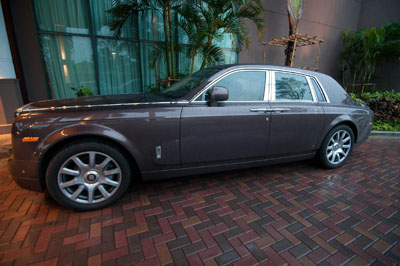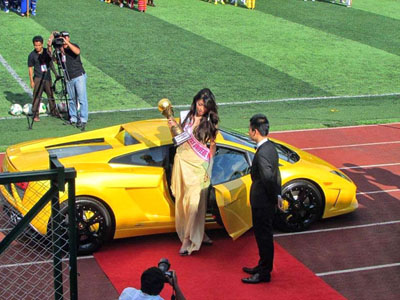MYAWADDY, Kayin State — With its bumpy roads and deep poverty, Myanmar is one of the last places you expect to come across a flashy new Ferrari sports car. But in late May, that is what I saw sitting on the back of a truck in the border town of Myawaddy.
Actually, as the main hub for border trade between Myanmar and Thailand, Myawaddy is the kind of place where you wouldn’t be surprised to see almost anything. It’s a town built on contraband: For decades, everything from vegetables and consumer goods to high-end electronics and second-hand cars has crossed the border into Myanmar here—sometimes legally over the Friendship Bridge, but more often undeclared through 20 or so checkpoints controlled by various armed groups. Local traders say that at least US$3 million worth of goods enter the country this way every day.
But it is only since last year that luxury vehicles have begun to make an appearance on the border, according to Yangon-based car traders. Until then, they say, there was probably only one Ferrari in the entire country—the one owned by U Tay Za, a US-blacklisted crony who had his flown in to add to a fleet that also included Myanmar’s only Lamborghini. Now, they claim, there are at least 10 Ferraris, 10 Lamborghinis and 40 Rolls-Royces in the country, all of them imported through Myawaddy.
So what’s driving this sudden influx of luxury vehicles? Although growing demand—Myanmar has a tiny elite with a pent-up desire for the finer things in life, largely denied them during the era of international isolation—undoubtedly plays a role, the real impetus appears to be more political than economic.
Since assuming power as head of a quasi-civilian government in 2011, President U Thein Sein has made efforts to end decades of ethnic conflict a centerpiece of his agenda. Although military objections to federalism—a key ethnic demand—have stood in the way of reaching a comprehensive settlement, the push for peace has had some notable successes, particularly in Kayin State. It’s here that the Karen National Union (KNU), Myanmar’s longest-running insurgent army, has made unprecedented moves towards détente with the central government, a development that has earned the government international praise.

Critics say, however, that much of this progress has been based on economic inducements, rather than real compromise. They note that U Aung Min, the president’s chief peace negotiator, has handed out hundreds of car registration permits to armed groups as “peace gifts” that many see as little more than a form of bribery.
Sources close to the peace process have confirmed that the number of permits handed out so far has been significant. According to U Hla Maung Shwe, a special adviser to the government-backed Myanmar Peace Council (MPC), permission had been granted to register 800 cars in total—270 of them completely tax free. He said only three out of the 17 ethnic armed groups remaining in the country have yet to be given any registration permits.
U Aung Min has denied, however, that the permits—many of them handed out with his signature on them on Feb. 12, 2013, during a ceremony to mark Union Day—are of any economic value.
“They are not permits, as others are saying. It is just allowing their [ethnic groups’] unlicensed vehicles to be registered as they have vehicles without licenses,” he told The Irrawaddy, adding: “The decision did not come from me or the president. It was the decision of the relevant government meeting.”

But whatever their professed purpose, it’s clear that the armed groups see the permits as a source of income. Saw Kwe Htoo Win, the KNU’s general secretary, confirmed that his group had received some 120 car permits, most of which had been sold to convert the government gift into cash for organizational needs. (Other large groups, including the United Wa State Army and the New Mon State Party, have reportedly received the same number of permits, while smaller outfits such as the All Burma Students’ Democratic Front have been given 60 permits, sources said.)
According to one car dealer, the value of the permits depends on the type of permit (some, for instance, are only valid in the state where the armed group is active) and the value of the vehicle. With most cars now much cheaper since the government relaxed import restrictions in 2011, dealers use the permits to buy the most expensive cars possible, paying up to US$50,000 for one that can be used to buy a Rolls-Royce. For the dealers, who would normally have to pay as much as $600,000 in taxes for a vehicle of this value (which can sell for $800,000 in Myanmar), the “peace permits” are a bargain.
So far, however, there has been limited peace dividends for civilians living in areas where conflict has been suspended but not ended, and standoffs between government and ethnic army troops still result in fresh clashes.
Irrawaddy reporter Lin Thant and Myanmar-language editor Yeni contributed to this report.
This story first appeared in the August 2014 edition of The Irrawaddy magazine.

















